WNET / UCH Urban Academy
“Exploring Powerful Ideas Inquiry-Based Teaching: Discussing Non-Fiction”
UA History 26 min
MICHELLE:
It’s extremely different from my other school. Um, most classes are discussion based and we’re not really reading from a textbook and answering questions but we actually talk about what we think.
NASIR:
I feel more involved in classes. It’s not just a teacher dictating information to you. It’s like you have a part in what you’re learning.
JABARII:
I like talking about things. I like talking to other students as opposed to just reading or just listening to a teacher talk because then I have motivation in staying involved in the class and being engaged
AVRAM BARLOWE:
Would everybody just make sure they have this- these documents out? “The Meaning of Freedom After the Civil War”. Past the first letter, into the first person accounts. That’s where we are. In the old type set, first person accounts, and this is what I ask people to look at… What did freedom mean to the different players in the post-war period after the Civil War? What did it mean to slave reformers?
----AUDIO DROPS OUT---
AVRAM BARLOWE:
One of the things that seemed to be a very important part of freedom… yes? Question? Should I read it outloud? Would that be helpful? Alright, let me read the first document out loud. This is a preacher, obviously a black man, I assume a former slave, it’s a speech he gave. It says an impromptu speech. Anyone know what an impromptu speech means? On the spot, unrehearsed speech. “You ain’t none of you gwine to feel real free til you shake the dust of the old plantation off your feet and goes to a new place where he can live out of sight of the great house”.
AVRAM BARLOWE:
“Take your freedom my brothers and sisters. You are all just as good as anybody. And you’re just as free. Go where you please. Forget about the white folk.”
---- AUDIO DROPS OUT ----
-
AVRAM BARLOWE:
What does freedom mean to this man? And Jay, before I ask that question, anything about that you didn’t follow?
-
JAY:
I understand it now. He’s basically telling the slaves to use their freedom and get away from the South.
-
AVRAM BARLOWE:
Okay. And what would you say freedom means?
-
EZRA:
I think he’s saying freedom means getting rid of your old life and moving on. Like getting away from the plantation and getting rid of your old master and moving on to a life where you don’t have to look at the life you had as a slave.
-
AVRAM BARLOWE:
And do people agree that that’s freedom? I mean, I guess that’s my question.
---- AUDIO DROPS OUT ----
-
AVRAM BARLOWE:
Are you not free until you leave the plantation? Even though- would people agree with that? Saloul and then Jabari.
SALOUL:
Cause you’re still enslaved. I don’t think they knew at that point that they would be enslaved like in a different type of way, with the whole sharecropping thing. Like it wasn’t slavery but it was like a vicious cycle. They would have to be a part of…
AVRAM BARLOWE:
Jabari.
-
JABARII:
They are free, legally, obviously, but I feel like, obviously, in reality, they’re not gonna get their freedom staying on that plantation because that owner is gonna take advantage of the fact that they previously owned them, I guess.
-
STUDENT:
The [inaudible] of freedom in their mind was not being in slavery.
-
SALOUL:
It wasn’t like assault like this is was kinda like-
---- AUDIO DROPS OUT ----
-
AVRAM BARLOWE:
Yes? Jamilla?
JAMILLA:
You asked if we thought that was freedom in his opinion?
AVRAM BARLOWE:
Yes.
JAMILLA:
No. Because how are they gonna make money if they get away? Like he’s saying get away and forget about white people but like how are they, how are they all gonna do that and it work? So, no, I don’t think it’s freedom.
AVRAM BARLOWE:
Ezra.
EZRA:
I think it is freedom because as like in the letter we read yesterday, he had left and he got a job and I assumed that since slavery had ended, there were a lot of people who needed workers and I am sure that if he left, he could find a place to work.
AVRAM BARLOWE:
Ezra spoke and then with Jamilla so…
STUDENT:
I mean, I somewhat disagree with you Ezra just because I think that even if they were free from slavery, that doesn’t necessarily mean that they’re free as people because they still had like black laws and stuff that restricted on what exactly former slaves or black people could do. So they weren’t necessarily free. They were just free from being slaves.
AVRAM BARLOWE:
I mean, and the thing we’re wrestling here with is, “What’s freedom?” I mean, is freedom- If you leave the plantation, does that make you free? He’s saying you’re not free, I think, until you leave. Jamilla’s saying even that’s not really freedom because if you don’t have money, just leaving doesn’t make you free, okay? Did you want to respond?
EZRA:
I don’t think that the guy…
---- AUDIO DROPS OUT ----
STUDENT:
I think that there’s too many definitions of freedom back then because freedom to the slaves meant one thing. Freedom to the slave owners meant another thing and people in the North and just people in general and in the government. And I also feel like freedom wasn’t respected. Some people were like, “Okay, well you’re free but I don’t respect your freedom”. So they don’t really get to take advantage of their rights because other people don’t respect their freedom.
AVRAM BARLOWE:
I mean you raise an interesting question, because I assume you read some of the rest of this stuff and there are different definitions of freedom based on what we read. He raises an interesting question which I’d like to highlight here but let me just say in terms of what Jamilla and Ezra and Saloul are disagreeing on in terms of “does leaving make you free?” I think one thing we need to know more about is that, how available was work for black people off the plantation? I mean, we’re making arguments about how available we think it was. I don’t think we fully know and I’ll take comments on that and questions although I think we need to do some more research on that.
AVRAM BARLOWE:
But Jafar raises another question which is, you know, there are all this different definitions of freedom, how do you organize a society where being free means one thing to a black man, being free means another thing to his former owner, being free means another thing to the government and the Union army and white people… How do you organize a society? And this the problem of Reconstruction, there are these conflicting definitions of freedom. Right? And he’s saying there’s too many. I don’t know if people agree with that. Are there too many?
---- AUDIO DROPS OUT ----
AVRAM BARLOWE:
So here’s a runaway slave having a conversation with a Union soldier. What question do you want to raise about this document?
SALOUL:
Well, like we talked about yesterday. I feel, um, I don’t think it wrong for what he did when he stole his masters horse and, in his eyes, that was his exit to freedom. And when it comes to freedom, sometimes you have to, like, you have to do what you have to do and, like, there was another article, another passage where someone stole a bed and a mattress and you can’t ride a mattress. Like it’s not a magical mattress that will take you to freedom.
SALOUL:
It doesn’t work like that. At least a horse, it will take you to where you need to go like you know, or a carriage, like you know. It’s different.
AVRAM BARLOWE:
Jamilla.
JAMILLA:
The one that Saloul was talking about was that the man felt like, like there was two other ones where it felt like, uh, that slaves were betraying their masters I guess and I guess that’s sort of what the guy was saying when he stole the horse. Like in the second one on the first page. And the second one on the second page too. That they felt like, um, that it was wrong for them to leave.
---- AUDIO DROPS OUT ----
AVRAM BARLOWE:
And I think what Saloul is saying is, if everyone can follow me, is that the man who took his masters horse to escape, that that is an act of freedom and that is a legitimate taking of the masters property but I think Saloul is saying that taking the bed of the master on the plantation is not an act of freedom and that they should not have taken that property. Is that correct?
STUDENT:
Yeah.
AVRAM BARLOWE:
Do people agree? Yes, Jabari?
JABARII:
I agree. That’s just like stealing but I mean even when he took the horse, that’s still stealing. I mean, I don’t understand… I don’t know if he’s considered a citizen now but he’s a free person and obviously he needed to take that horse to get to freedom but it’s still stealing to me.
STUDENT:
Justified.
JABARII:
Yeah. It’s justified.
AVRAM BARLOWE:
What’s his argument? Let’s go… let’s go to the actual document. The fourth document. What is his defense? Why does he say- I don’t think he thinks its stealing and why does he say he doesn’t think its stealing? James and then Ezra.
JAMES:
He thinks that the horse is sort of his pay for all the work that he did for the guy for thirty years.
AVRAM BARLOWE:
Alright. I guess that’s my question. He says, right, I worked for this guy for thirty years. I feel like I didn’t steal anything. I feel like I deserve the horse. The horse is mine. So I think he’s both disagreeing with Saloul and Jabari in saying, “I didn’t steal. That horse is my property because I worked on that plantation for and never got any payment”. Is he right or are Jabari and Saloul right? I guess that’s my question. Ezra, Saloul, Jabari.
EZRA:
I think that he’s right because, yes, he worked for thirty years which is a long time, which warrants a lot of pay for somebody who had been free so now that he is a free person and he took the eight- he took the horse and the thousand dollars which is so little compared to what the work he actually gave to the family so it doesn’t even really make up for it but it’s good enough for… it justifies what he did.
AVRAM BARLOWE:
Jabari.
JABARII:
I think his definition of freedom was like, payback, kind of- Not necessarily payback like revenge but like, okay-
AVRAM BARLOWE:
What he’s owed.
JABARII:
Yeah. You’re gonna give me what you owe me. So you owe me a horse, I’m gonna take it.
AVRAM BARLOWE:
Is that a legitimate definition of freedom? Is he right to say, “Part of my freedom involves payback to me”. Is that right?
STUDENT:
Morally.
AVRAM BARLOWE:
Morally.
JAMILLA:
But then he doesn’t agree with like the sofa. I mean, the mattress.
AVRAM BARLOWE:
Well, let’s talk about that. Let’s turn to this. The second one. Because I think that’s very interesting. Let me re-read it. “For they broke into our well-furnished residence on each plantation and stole-“ Who’s the “they” in that sentence?
JAMILLA:
The slaves.
AVRAM BARLOWE:
The former slaves, right. “For they broke into our well-furnished residences” - meaning the big house I supposed- “on each plantation and stole and destroyed everything therein. Nowhere is there an incidence on a solitary plantation of any of our Negroes preserving for us a single thing whatever. A Negro woman, Peggy, seized as part of the spoils, my wife’s large and handsome mahogany bedstead and mattress and arranged it in her own Negro house on which she slept for some time. And in the pry of their freedom she got some pink ribbons and tied a dozen bows to the wooly head of her daughter, to the admiration of other Negroes.”
AVRAM BARLOWE:
Now – does freedom mean that the bed- the bed and the farm belong to the slaves or the former slaves?
JAMILLA:
That’s the same as the other one where they felt that they were owed something for being, for being slaves. It’s the same thing. They just took something different.
AVRAM BARLOWE:
Is this them saying, “We’re owe the bed and the bed now belongs to one of us” or, or, or are they just taking something that they want?
AVRAM BARLOWE:
Is taking the bed an act of freedom?
STUDENT:
Yes.
AVRAM BARLOWE:
Or is taking the bed an act of theft?
STUDENTS:
Both.
STUDENT:
It’s definitely stealing because it’s a civilized country and there’s laws and because they’re free, they should obey those laws. I’m not saying that they shouldn’t get reparations but they shouldn’t take it upon themselves to just take what they think they deserve.
AVRAM BARLOWE:
Jamilla, what were you going to say?
JAMILLA:
I think they’re acting on example. Their right to be free, they’re acting on example of what they’ve seen. Just like, I guess the white people took what they wanted and that was their freedom so why can’t they do their same if that’s what they’ve seen? And that’s what they’ve known so I think it’s the same thing.
AVRAM BARLOWE:
Do you want to respond to that Rio because I think—Let me, if I’m not mistaken, you’re saying yes they may have ultimately the right to the land and the right to the house ultimately but they should wait for the law to give them that house and that just taking it without the law on their side, that’s stealing.
AVRAM BARLOWE:
Jamilla is saying that it’s not stealing because they are taking what they want because the white people, when they were the masters, took what they wanted. Um, you know, and so from her point of view it’s not stealing. Ezra, and so… okay, go ahead.
---- AUDIO DROPS OUT ----
AVRAM BARLOWE:
Well, no. He thinks its right in terms of protecting peoples rights but its wrong. I think it raises this question of like-
-Chopped up footage
SALOUL:
But basically, I don’t think. I feel like no matter who I am, if I’m a slave master, if I’m a nurse, if my bed is taken, I’m gonna be upset. So it’s like… it’s your bed.
AVRAM BARLOWE:
Do they have a right to be upset? Jabari?
JABARII:
I think they have the right to be upset but I honestly think that the general mindset of these people is like hypocritical. I can do this to you but you can’t do this to me. I don’t think that they recognize that – I don’t know if they’re considered equal yet but – I don’t think they recognize the change of position of people and they still feel that they can do wrong to them but shouldn’t have wrong done…
AVRAM BARLOWE:
So what do you do with people like this after the civil war? Who are outraged that slaves took their property, right, but they think that they have the right to take any black persons property. What do you do with people? How do you build a society where you have these people who used to run the society, now as Saloul said, they don’t have their beds, they’re mad at that they don’t have their beds.
(laughter)
But they, they, they have absolutely no intention of respecting the rights of anybody black… What do you do with them? How do you make these people regular people participating in society?
AVRAM BARLOWE:
Is it possible? Is it impossible? Jamilla.
JAMILLA:
You make laws to go on their side.
AVRAM BARLOWE:
You make laws to… what do you mean by that?
JAMILLA:
Like the whole, what Naz was saying with the black codes or whatever, black laws. I guess that’s what they did. And they did more after that as well.
AVRAM BARLOWE:
But I’m posing a problem that’s a little different from your answer because you’re saying, “What do the white people do in that position to protect their position of power?” But I’m saying, assuming you’re the Northern army and you’re here and the Union government and you’re here assuming for a moment to create a society where people are equal now and where everybody’s free, what do you do with people who don’t want to respect the freedom of other people?
JAMILLA:
Nothing.
AVRAM BARLOWE:
Nothing?
JAMILLA:
You can’t make people respect other people.
AVRAM BARLOWE:
You cannot make people respect other people’s freedom. Do people agree with that statement? Naz and then Jabari.
STUDENT:
Yeah. I agree. No matter how many laws you try and make on like trying to get black and white people free, you really can’t change all of the opinions of all these people. There are even people in like the places where slavery was abolished, in New York or whatever, when they had the riots and were attacking black people. They even had people taking advantage of black people there so why wouldn’t they do it in the South?
AVRAM BARLOWE:
Yes, Jabari.
JABARII:
I agree because, like, you could put fear in somebody’s heart but you can’t really make them respect you until they consciously decide to respect you.
---- AUDIO DROPS OUT ----
AVRAM BARLOWE:
Let me take you down to the last, the bottom quotation on the second page because I think this is an example of what we’re talking about. Uh, the two confederates cornered by the journalist. Did everyone see the bottom two paragraphs? “The Negro needs as much of a master to guide him as a child does. When I look at my servants I feel all the responsibilities weighing upon me as a parent. The Negro will always need the care of someone superior to him and unless one form or another is extended to him, the race will first become pauper” – pauper? Definition?
STUDENT:
Poor.
AVRAM BARLOWE:
Yeah poor. “And then disappear. You don’t know the Niggers. No nigger, free or slave, in these southern states, nor in any part of the known world ever would work or ever will work unless he’s made to”. Now, what do you do with people like that? Do you deny them the right to vote? Do you deny them the right to be in the government? Or do you say you can’t change their mind, they should have the same rights as everybody else. What do you do with people like that? Ezra, Saloul then Jamilla.
EZRA:
I mean, I think they have the right to their opinion no matter how crazy or wrong it may be but they just shouldn’t be allowed to act on it and if they do something that would harm another person or harm society then they should be tried or put in jail or some of their rights be taken away but they should have the rights to their opinion as long as they don’t enact on it.
AVRAM BARLOWE:
Saloul.
SALOUL:
I’m asking a question before I give my answer. So what happens with people who commit treason? Right now.
AVRAM BARLOWE:
Right now. Today? What happens with people who are convicted of treason?
SALOUL:
Like they get sentenced how long? Because it’s a felony. Right?
AVRAM BARLOWE:
It’s more than a felony. I mean, treason, I mean, you can be executed for treason.
SALOUL:
Oh wow. Okay, so then, I feel, um, that all these people committed treason so why couldn’t they just be executed?
AVRAM BARLOWE:
What about… He’s saying these people did commit an act of treason, they don’t want to respect the freedom of the former slaves, why don’t we just kill them all.
(classroom laughter)
I mean, this happens. Jamilla and Ezra.
JAMILLA:
Okay, we can say, “We think. We think. We think.” But even when they were in the war they were taking, like the black hostages and in the South, nothing was being done when they were being killed and put back into slavery so what makes us think that they would do anything against these, against these, um, racist attitudes in the country? Like we not even saying that they emancipated the slaves because that’s what they wanted to do but as a, as a like as a war or whatever. War tactic or whatever.
JAMILLA:
So I don’t think it’s as important as we’re making it seem to everyone else.
AVRAM BARLOWE:
Okay so you’re saying Saloul may say today that they should be executed but noone was gonna take that seriously back then. I don’t know.
JAMILLA:
…Lincoln cared.
AVRAM BARLOWE:
So there’s two questions here: one would it have made sense to execute all of these people?
JAMILLA:
No.
AVRAM BARLOWE:
Well that’s the first question and then the second question is: Is this something that, that some people in the country would have supported. Would abolitionists have supported it? Would black people have supported it?
(Jamilla tries to interrupt)
Or would the powerful people in the government, as Jamilla suggests, have been completely opposed to this? So there’s two questions: would it have been a good idea in theory to kill all of these people? And the second question is would it have gotten any support in 1865? Ezra.
EZRA:
Um, well, I mean, if these people are going around, like, attacking black people or taking their land and stuff that should - they should be put in jail or just prosecuted at the least but I don’t think that they should all be executed because that’s a little extreme. I mean, they’re not committing severe treason, like assassinating a judge or going against your country in a really extreme way. They are going against the law and disobeying law of having, of letting black people be free but back then I don’t think execution for something like that, or even today, I mean, that would be an…
---- AUDIO DROPS OUT ----
AVRAM BARLOWE:
So you’re saying if they attack black people after slavery ended and if they seek to sort of forcibly harm, then they should be executed but they shouldn’t be executed just for having fought on the Southern side and being racist. I mean, is what you’re saying. Saloul and Jamilla.
SALOUL:
I think extreme times calls for extreme measures. And these times were very extreme times and, um, why not kill them?
AVRAM BARLOWE:
Jamilla.
JAMILLA:
Alright. So I’m confused. Like, everyone’s saying what they think would have been better or what we think actually could have been done?
AVRAM BARLOWE:
I’m asking both questions.
JAMILLA:
Okay, well about the first one I guess people are saying what they think but I don’t think anyone is saying anything that could have actually been done because look at what stuff happens up until this day and continues to happens. So I feel like nothing anyone is saying is realistic, especially Saloul and executing everyone because, like, that makes no sense.
AVRAM BARLOWE:
Okay. Rio. Then Jabari.
RIO:
It wouldn’t have happened regardless because the reason that Lincoln started the war was to bring back the South and if you’re just gonna kill all their leaders it’s just gonna bring back the sectional divide that they had.
SALOUL:
Teach them a lesson.
RIO:
Sure but you’re just gonna be sort of where you started- it just wouldn’t have worked.
---- AUDIO DROPS OUT ----
AVRAM BARLOWE:
…what Saloul and Rio are arguing about because this is a very fundamental question in the history of the period. She is saying, “Look the goal of the war was to unite the country. If we follow Saloul’s policy and kill all the white leaders of the South then we’re going to turn off all the white peope of the South and we’ll never be able to make them part of the country again.” Saloul is saying, “But don’t you want those people taught a lesson that they have to respect the rights of black people now that they’re no longer slaves? And if you don’t execute these people, if you don’t execute these people, that lesson will not be taught and, and, and people will be trampled on.” Whose right?
AVRAM BARLOWE:
If we go back to the third document-
---- AUDIO DROPS OUT ----
JABARII:
I think, instead of having to kill them, make them agree to abiding by these rules otherwise they’ll be punished by… say like prison or whatever. Something a little more moral than killing people.
AVRAM BARLOWE:
Okay and this by the way becomes an issue in the middle of the war, as we’re gonna see later in the week. Between Lincoln and Congress…
(music fades up)
How – once we defeat these people, how are we gonna treat them?
MICHELLE:
It helps me because in my papers I just don’t talk about my opinion but I talk about everybody else’s opinion and the arguments that we raise in class.
NASIR:
I feel like you learn more because you learn about other peoples opinions and you get to share how you feel about the subject.
JABARI:
We go very deep into detail about things so I think I’ve become a better speaker and thinker.
* * *END OF AUDIO* * *
* * *END OF TRANSCRIPT* * *

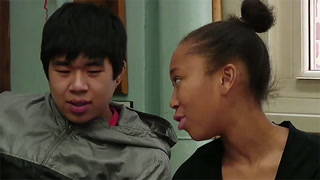
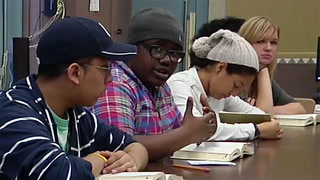
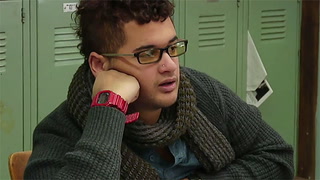

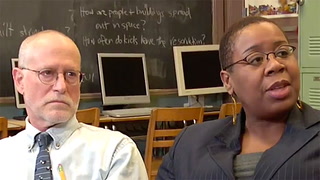
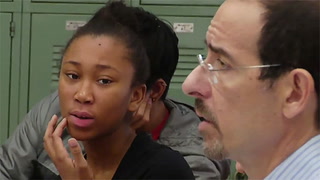
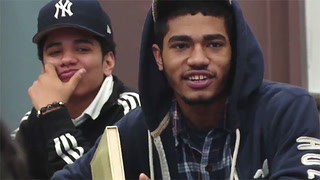
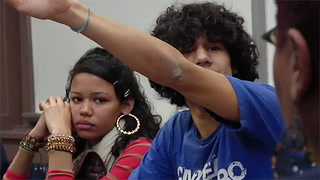
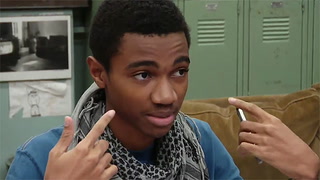
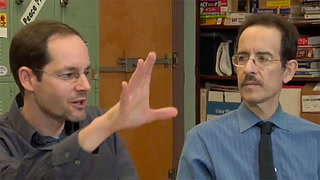
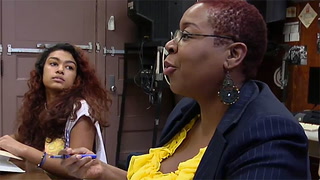
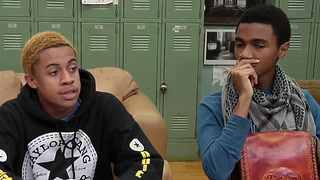








15 Comments
Malcolm Stokes Feb 16, 2021 11:01am
I loved watching this. Would love to have these type of discussions in my classes.
Fausto Junior Gomez Jul 11, 2017 12:59am
Misty Tucker Apr 30, 2017 5:15pm
Karen Posey Sep 25, 2016 12:55pm
Timeka Gilliam Jul 31, 2016 9:46pm